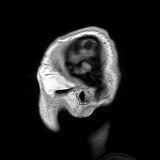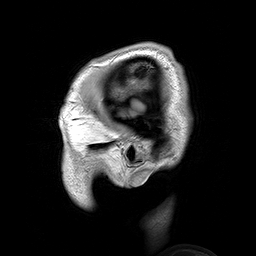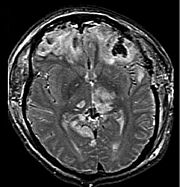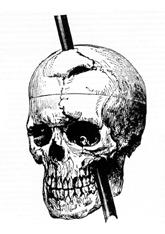
Acquired brain injury
Encyclopedia


Brain damage
"Brain damage" or "brain injury" is the destruction or degeneration of brain cells. Brain injuries occur due to a wide range of internal and external factors...
caused by events after birth
Birth
Birth is the act or process of bearing or bringing forth offspring. The offspring is brought forth from the mother. The time of human birth is defined as the time at which the fetus comes out of the mother's womb into the world...
, rather than as part of a genetic
Genetic disorder
A genetic disorder is an illness caused by abnormalities in genes or chromosomes, especially a condition that is present from before birth. Most genetic disorders are quite rare and affect one person in every several thousands or millions....
or congenital disorder such as fetal alcohol syndrome
Fetal alcohol syndrome
Fetal alcohol syndrome is a pattern of mental and physical defects that can develop in a fetus in association with high levels of alcohol consumption during pregnancy. Current research also implicates other lifestyle choices made by the prospective mother...
, perinatal illness or perinatal hypoxia. ABI can result in cognitive
Cognition
In science, cognition refers to mental processes. These processes include attention, remembering, producing and understanding language, solving problems, and making decisions. Cognition is studied in various disciplines such as psychology, philosophy, linguistics, and computer science...
, physical, emotion
Emotion
Emotion is a complex psychophysiological experience of an individual's state of mind as interacting with biochemical and environmental influences. In humans, emotion fundamentally involves "physiological arousal, expressive behaviors, and conscious experience." Emotion is associated with mood,...
al, or behavioural impairments that lead to permanent or temporary changes in functioning. These impairments result from either traumatic brain injury
Traumatic brain injury
Traumatic brain injury , also known as intracranial injury, occurs when an external force traumatically injures the brain. TBI can be classified based on severity, mechanism , or other features...
(e.g. physical trauma
Physical trauma
Trauma refers to "a body wound or shock produced by sudden physical injury, as from violence or accident." It can also be described as "a physical wound or injury, such as a fracture or blow." Major trauma can result in secondary complications such as circulatory shock, respiratory failure and death...
due to accident
Accident
An accident or mishap is an unforeseen and unplanned event or circumstance, often with lack of intention or necessity. It implies a generally negative outcome which may have been avoided or prevented had circumstances leading up to the accident been recognized, and acted upon, prior to its...
s, assaults, neurosurgery
Neurosurgery
Neurosurgery is the medical specialty concerned with the prevention, diagnosis, treatment, and rehabilitation of disorders which affect any portion of the nervous system including the brain, spine, spinal cord, peripheral nerves, and extra-cranial cerebrovascular system.-In the United States:In...
, head injury
Head injury
Head injury refers to trauma of the head. This may or may not include injury to the brain. However, the terms traumatic brain injury and head injury are often used interchangeably in medical literature....
etc.) or nontraumatic injury
Injury
-By cause:*Traumatic injury, a body wound or shock produced by sudden physical injury, as from violence or accident*Other injuries from external physical causes, such as radiation injury, burn injury or frostbite*Injury from infection...
derived from either an internal or external source (e.g. stroke
Stroke
A stroke, previously known medically as a cerebrovascular accident , is the rapidly developing loss of brain function due to disturbance in the blood supply to the brain. This can be due to ischemia caused by blockage , or a hemorrhage...
, brain tumours, infection
Infection
An infection is the colonization of a host organism by parasite species. Infecting parasites seek to use the host's resources to reproduce, often resulting in disease...
, poison
Poison
In the context of biology, poisons are substances that can cause disturbances to organisms, usually by chemical reaction or other activity on the molecular scale, when a sufficient quantity is absorbed by an organism....
ing, hypoxia
Hypoxia (medical)
Hypoxia, or hypoxiation, is a pathological condition in which the body as a whole or a region of the body is deprived of adequate oxygen supply. Variations in arterial oxygen concentrations can be part of the normal physiology, for example, during strenuous physical exercise...
, ischemia
Ischemia
In medicine, ischemia is a restriction in blood supply, generally due to factors in the blood vessels, with resultant damage or dysfunction of tissue. It may also be spelled ischaemia or ischæmia...
, encephalopathy
Encephalopathy
Encephalopathy means disorder or disease of the brain. In modern usage, encephalopathy does not refer to a single disease, but rather to a syndrome of global brain dysfunction; this syndrome can be caused by many different illnesses.-Terminology:...
or substance abuse
Substance abuse
A substance-related disorder is an umbrella term used to describe several different conditions associated with several different substances .A substance related disorder is a condition in which an individual uses or abuses a...
). ABI does not include damage to the brain resulting from neurodegenerative disorders.
While research has demonstrated that thinking and behavior may be altered in virtually all forms of ABI, brain injury is itself a very complex phenomenon having dramatically varied effects. No two persons can expect the same outcome or resulting difficulties. The brain controls every part of human life: physical, intellectual, behavioral, social and emotional. When the brain is damaged, some part of a person's life will be adversely affected.
Consequences of ABI often require a major life adjustment around the person's new circumstances, and making that adjustment is a critical factor in recovery and rehabilitation. While the outcome of a given injury depends largely upon the nature and severity of the injury itself, appropriate treatment plays a vital role in determining the level of recovery.
Emotional Implications
ABI has been associated with a number of emotional difficulties such as depression, issues with self-control, managing angerAnger
Anger is an automatic response to ill treatment. It is the way a person indicates he or she will not tolerate certain types of behaviour. It is a feedback mechanism in which an unpleasant stimulus is met with an unpleasant response....
impulses and challenges with problem-solving, these challenges also contribute to psychosocial concerns involving social anxiety
Social anxiety
Social anxiety is anxiety about social situations, interactions with others, and being evaluated or scrutinized by other people...
, loneliness and lower levels of self esteem. These psychosocial problems have been found to contribute to other dilemmas such as reduced frequency of social contact and leisure activities, unemployment, family problems and marital difficulties.
How the patient copes with the injury has been found to influence the level at which they experience the emotionally complications correlated with ABI. Three coping strategies
Coping Strategies
Coping Strategies is treatment designed for posttraumatic stress disorder within United States Armed Forces personnel and their families by the charitable organization Patriot Outreach...
for emotions related to ABI have presented themselves in the research, approach-oriented coping, passive coping and avoidant coping. Approach-oriented coping has been found to be the most effective strategy, it has been negatively correlated with rates of apathy
Apathy
Apathy is a state of indifference, or the suppression of emotions such as concern, excitement, motivation and passion. An apathetic individual has an absence of interest in or concern about emotional, social, spiritual, philosophical or physical life.They may lack a sense of purpose or meaning in...
and depression in ABI patients, this coping style is present in individuals who consciously work to minimize the emotional challenges of ABI. Passive coping has been characterized by the person choosing not to express emotions and a lack of motivation which can lead to poor outcomes for the individual. Increased levels of depression have been correlated to avoidance coping methods in patients with ABI, this strategy is represented in people who actively evade coping with emotions. These challenges and coping strategies should be kept in consideration when seeking to understand individuals suffering from ABI.
Effect on Children and Youth
In children and youth with ABI the cognitive and emotional difficulties that stem from their injury can negatively impact their level of participation in home, school and other social situations, participation in structured events has been found to be especially hindered under these circumstances. Involvement in social situations is important for the normal development of children as a means of gaining an understanding of how to effectively work together with others. Furthermore, young people with ABI are often reported as having insufficient problem solving skills. This has the potential to hinder their performance in various academic and social settings further. It is important for rehabilitation programs to deal with these challenges specific to children who have not fully developed at the time of their injury.Effect on Memory
Following acquired brain injury it is common for patients to experience memory lossMemory loss
Memory loss can be partial or total and it is normal when it comes with aging. Sudden memory loss is usually a result of brain trauma and it may be permanent or temporary. When it is caused by medical conditions such as Alzheimers, the memory loss is gradual and tends to be permanent.Brain trauma...
, memory disorders are one of the most prevalent cognitive deficits experienced in sufferers. However because some aspects of memory
Memory
In psychology, memory is an organism's ability to store, retain, and recall information and experiences. Traditional studies of memory began in the fields of philosophy, including techniques of artificially enhancing memory....
are directly linked to attention it can be challenging to assess what components of a deficit are caused by memory and which are fundamentally attention
Attention
Attention is the cognitive process of paying attention to one aspect of the environment while ignoring others. Attention is one of the most intensely studied topics within psychology and cognitive neuroscience....
problems. There is often partial recovery of memory functioning following the initial recovery phase, however permanent handicaps are often reported with ABI patients reporting significantly more memory difficulties when compared people without an acquired brain injury.
In order to cope more efficiently with memory disorders many people with ABI use memory aids; these included external items such as diaries, notebooks and electronic organizers, internal strategies for example visual associations, and environmental adaptations such as labeling kitchen cupboards. Research has found that ABI patients use an increased number of memory aids after their injury than they did prior to it and these aids vary in their degree of effectiveness. One popular aid is the use of a diary, studies have found that the use of a diary is more effective if it is paired with self-instructional training, this was related to more frequent use of the diary over time and proved to be more successful as a memory aid.
Memory Rehabilitation
Some strategies for rehabilitating the memory of those effected by ABI have used repetitive tasks to attempt to increase the patients ability to recall information. While this type of training increases performance on the task at hand, there is little evidence that the skills translate to improved performance on memory challenges outside of the laboratory. Awareness of memory strategies, motivation and dedication to increasing memory have been related to successful increases in memory capability among patients an example of this could be the use of attention process training and brain injury education in patients with memory disorders related to brain injury. These have been shown to increase memory functioning in patients based on self-report measures.Another strategy for improvement amongst individuals with poor memory functioning is the use of elaboration to improve encoding of items, one form of this strategy is called self-imagining whereby the patient imagines the event to be recalled from a more personal perspective. Self-imagining has been found to improve recognition memory by coding the event in a manner that is more individually salient to the subject. This effect has been found to improve recall in individuals with and without memory disorders.
There is research evidence to suggest that rehabilitation programs that are geared toward the individual my have greater results than group-based interventions for improving memory in ABI patients because they are tailored to the symptoms experienced by the individual.
More research is necessary in order to draw conclusions on how to improve memory among individuals with ABI that experience memory loss.
Rehabilitation
Rehabilitation following an acquired brain injury does not follow a set protocol due to the variation in mechanisms causing the injury and structures affected. Rather, it is an individualized process that will often involve a multi-disciplinary approach. Rehabilitation should be guided by the patient’s needs and goals. The rehabilitation team may include but is not limited to nurses, neurologists, physiotherapists, occupational therapists, speech-language pathologists, and psychologists.Famous Cases

- Phineas GagePhineas GagePhineas P. Gage was an American railroad construction foreman now remembered for his improbablesurvival of an accident in which a large iron rod was driven completely through his head, destroying much of his brain's left frontal lobe, and for that injury's reported effects on his personality and...
’s case of traumatic brain injury that had a great influence on the way medical practitioners understood the physiologyPhysiologyPhysiology is the science of the function of living systems. This includes how organisms, organ systems, organs, cells, and bio-molecules carry out the chemical or physical functions that exist in a living system. The highest honor awarded in physiology is the Nobel Prize in Physiology or...
of the brain. - Patient HM underwent neurosurgery to remove scar tissue in his brain that was causing debilitating epileptic seizures, neurosurgeon William Beecher ScovilleWilliam Beecher ScovilleWilliam Beecher Scoville was a neurosurgeon at Hartford Hospital. He performed surgery on Henry Gustav Molaison in 1953 to relieve epilepsy that led to damage of Molaison's hippocampus and left him with memory disorder....
performed the surgery which created bilateral lesions near the hippocampusHippocampusThe hippocampus is a major component of the brains of humans and other vertebrates. It belongs to the limbic system and plays important roles in the consolidation of information from short-term memory to long-term memory and spatial navigation. Humans and other mammals have two hippocampi, one in...
. These lesions helped remove symptoms of the epilepsy in H.M. but resulted in anterograde amnesiaAnterograde amnesiaAnterograde amnesia is a loss of the ability to create new memories after the event that caused the amnesia, leading to a partial or complete inability to recall the recent past, while long-term memories from before the event remain intact. This is in contrast to retrograde amnesia, where memories...
. H.M. Has been studied by hundreds of researchers since this time, most notably Brenda MilnerBrenda MilnerBrenda Milner, is a Canadian neuroscientist who has contributed extensively to the research literature on various topics in the field of clinical neuropsychology. -Biography:...
, and has been greatly influential in the study of memory and the brain. - James BradyJames BradyJames Scott "Jim" Brady is a former Assistant to the President and White House Press Secretary under U.S. President Ronald Reagan...
who suffered brain damage during an assassination attempt on Ronald ReaganRonald ReaganRonald Wilson Reagan was the 40th President of the United States , the 33rd Governor of California and, prior to that, a radio, film and television actor....
. - Ken NortonKen NortonKenneth Howard Norton Sr. is a former heavyweight boxer. He is best known for his 12-round victory over a peak Muhammad Ali where he famously broke Ali's jaw, on March 31, 1973, becoming only the second man to defeat Ali as a professional .He and Ali...
who fought Muhammad AliMuhammad AliMuhammad Ali is an American former professional boxer, philanthropist and social activist...
, his traumatic brain injury was caused by an automobile accident. - ZasetskyZasetskyZasetsky is the pseudonym of a patient who was treated by Russian neuropsychologist Alexander Luria. Zasetsky suffered a severe brain injury, losing his ability to read, write, and speak , and suffering impaired vision, memory, and other functions.He was notable for the tenacity with which...
injured in the Battle of Smolensk, bullet entered his left parieto-occipital area, and resulted in a long coma. Following this he developed a form of agnosia and became unable to perceive the right side of things.
See also
Symptoms:- AnhedoniaAnhedoniaIn psychology and psychiatry, anhedonia is defined as the inability to experience pleasure from activities usually found enjoyable, e.g. hobbies, exercise, social interaction or sexual activity....
- ApraxiaApraxiaApraxia is a disorder caused by damage to specific areas of the cerebrum. Apraxia is characterized by loss of the ability to execute or carry out learned purposeful movements, despite having the desire and the physical ability to perform the movements...
- AphasiaAphasiaAphasia is an impairment of language ability. This class of language disorder ranges from having difficulty remembering words to being completely unable to speak, read, or write....
- AmnesiaAmnesiaAmnesia is a condition in which one's memory is lost. The causes of amnesia have traditionally been divided into categories. Memory appears to be stored in several parts of the limbic system of the brain, and any condition that interferes with the function of this system can cause amnesia...
Behavioral Manifestations:
- AdynamiaAdynamiaAdynamia means lack of strength or vigor due to a pathological condition. It is often associated with a range of neurological diseases such as multiple sclerosis and medial-frontal lobe lesions....
- DisinhibitionDisinhibitionDisinhibition is a term in psychology used to describe a lack of restraint manifested in several ways, including disregard for social conventions, impulsivity, and poor risk assessment. Disinhibition affects motor, instinctual, emotional, cognitive and perceptual aspects with signs and symptoms...
- Emotional floodingEmotionEmotion is a complex psychophysiological experience of an individual's state of mind as interacting with biochemical and environmental influences. In humans, emotion fundamentally involves "physiological arousal, expressive behaviors, and conscious experience." Emotion is associated with mood,...
- PerseverationPerseverationPerseveration is the repetition of a particular response, such as a word, phrase, or gesture, despite the absence or cessation of a stimulus, usually caused by brain injury or other organic disorder. If an issue has been fully explored and discussed to a point of resolution, it is not uncommon for...
External links
- Brain Injury Association of America
- National Institute of Neurological Disorders and Stroke (NINDS)
- Brain Injury Association of Canada
- Brain Injury Association of Queensland Australia
- Headway - the brain injury association
- Ontario Shores Centre for Mental Health Sciences
- Ontario Brain Injury Association

